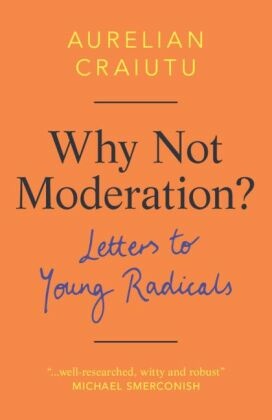Why Not Moderation? - Letters to Young Radicals
| Verlag | Cambridge University Press |
| Auflage | 2023 |
| Seiten | 260 |
| Format | 13,7 x 2,0 x 20,4 cm |
| Gewicht | 390 g |
| Artikeltyp | Englisches Buch |
| EAN | 9781108494953 |
| Bestell-Nr | 10849495UA |
Moderation can be a winning card. It can cure us of hubris and arrogance and helps combat extremism and fanaticism.
Moderation is often presented as a simple virtue for lukewarm and indecisive minds, searching for a fuzzy center between the extremes. Not surprisingly, many politicians do not want to be labelled 'moderates' for fear of losing elections. Why Not Moderation? challenges this conventional image and shows that moderation is a complex virtue with a rich tradition and unexplored radical sides. Through a series of imaginary letters between a passionate moderate and two young radicals, the book outlines the distinctive political vision undergirding moderation and makes a case for why we need this virtue today in America. Drawing on clearly written and compelling sources, Craiutu offers an opportunity to rethink moderation and participate in the important public debate on what kind of society we want to live in. His book reminds us that we cannot afford to bargain away the liberal civilization and open society we have inherited from our forefathers.
Inhaltsverzeichnis:
1. Why radical moderation?; Part I. The World We Live In: 2. Can liberal democracy be saved? Part II. What Kind of Virtue is Moderation?: 3. Rediscovering moderation in our immoderate age; 4. The skepticism toward moderation and what its critics miss about it; 5. The archipelago of moderation (I): the old world; 6. The archipelago of moderation (II): the new world; 7. An alternative to ideology; 8. An antidote to fanaticism; Part III. Do Moderates Have a Political Vision?: 9. The limits of moral clarity; 10. Against the politics of warfare; 11. No manichaeism and litmus tests; 12. Compromise; 13. Trimming and balance; 14. Centrism; 15. Eclecticism and pluralism; 16. Dialogue; Part IV. The Ethos of Moderation: 17. The spirit of moderation; 18. Modesty and humility; 19. Civility; 20. Prudence; 21. Realism and pragmatic partisanship; Part V. Who Needs Moderation Today?: 22. The last beacon of hope?.
Rezension:
'Why Not Moderation? provides a sturdy vindication of the concept as a muscular virtue. It also serves as an instructive and timely stimulus for understanding the importance of humility, prudence, and complexity in building up and conserving the delicate achievements of Western civilization from which radicals and moderates of all stripes benefit. That message alone should warrant applause, especially in an age when there remains a zealous yearning to burn shrubs to the ground rather than trim their imperfections.' National Review

